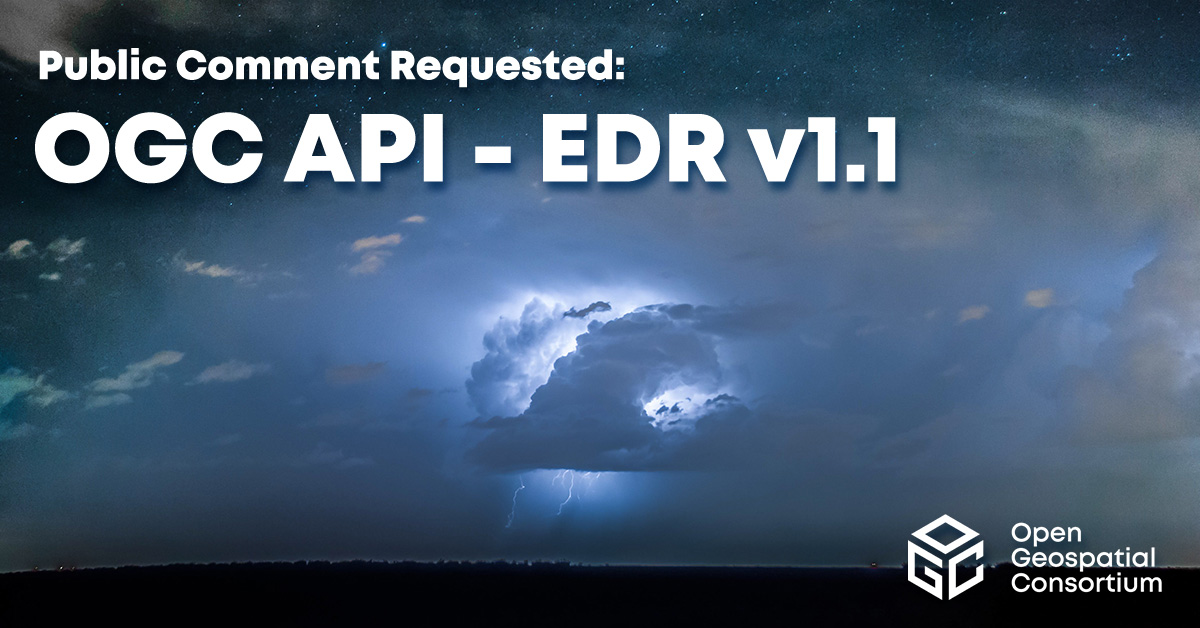The Open Geospatial Consortium (OGC) seeks public comment on the candidate Version 1.1 of the OGC API – Environmental Data Retrieval (EDR) Standard. Comments are due by February 27, 2023.
The OGC API – EDR Standard provides a family of lightweight query interfaces to access spatiotemporal data resources by requesting data at a Position, within an Area, along a Trajectory, or through a Corridor. An API compliant with the OGC API – EDR Standard will return only the data needed by the user or client, reducing data transfer time and costs.
The OGC API – EDR Standard makes it easier to efficiently access a wide range of geospatial ‘big data’ through a uniform, well-defined, simple Web interface that shields the user from the complexities of data storage. An example use case of the Standard could be to retrieve, say, weather forecasts for a local area from a much larger national or global forecast dataset – though many other types of data can be accessed through the API.
By defining a small set of query patterns (and no requirement to implement all of them), OGC API – EDR helps to simplify the design and performance-tuning of systems, making it easier to build robust, scalable infrastructures.
Version 1.1 of the OGC API – EDR Standard brings the following improvements:
- The optional use of HTTP POST as well as the HTTP GET verb. This will allow longer queries, such as when specifying a complicated, detailed area with very many points. The query payload is also encrypted and therefore more secure.
- Custom dimensions are allowed. As well as the usual 4 dimensions of space and time, (x,y,z,t), other dimensions could be offered by a data collection, such as frequency. The dimensions could also be categorical: that is, not necessarily continuous like space and time. For example, a list of wave or frequency bands, or any enumerated type. A meteorological example would be to allow data retrieval from individual ensemble members.
To learn more about how the family of OGC API Standards work together to provide modular “building blocks for location” that address both simple and the most complex use-cases, visit ogcapi.org.
OGC Members interested in staying up to date on the progress of this standard, or contributing to its development, are encouraged to join the Standards Working Group via the OGC Portal.
The candidate OGC API – Environmental Data Retrieval v1.1 standard is available for review and comment on the OGC Portal. Comments are due by February 27, 2023, and should be submitted via the method outlined below.
To Comment:
Comments can be submitted to a dedicated email reflector for a thirty day period ending on the “Close request date” listed above, Comments received will be consolidated and reviewed by OGC members for incorporation into the document. Please submit your comments using the following link: Click here to submit comments.
Please refer to the following template for the message body: Comments Template.
Subscribe to Comments:
You may wish to be added to the distribution list to receive comments as they are submitted. Subscribe to Distribution List. Subscribing to the list will also allow you to view comments already received, which can be found in the List Archives.
About OGC
The Open Geospatial Consortium (OGC) is a collective problem-solving community of more than 550 experts representing industry, government, research and academia, collaborating to make geospatial (location) information and services FAIR – Findable, Accessible, Interoperable, and Reusable.
The global OGC Community engages in a mix of activities related to location-based technologies: developing consensus-based open standards and best-practices; collaborating on problem solving in agile innovation initiatives; participating in member meetings, events, and workshops; and more.
OGC’s unique standards development process moves at the pace of innovation, with constant input from technology forecasting, practical prototyping, real-world testing, and community engagement.
OGC bridges disparate sectors, domains, and technology trends, and encourages the cross-pollination of ideas between different communities of practice to improve decision-making at all levels. OGC is committed to creating an inclusive and sustainable future.
Visit ogc.org for more info on our work.
